WDI is supporting the growth of Industry.AI’s renewable energy portfolio in Brazil and South Africa. In early 2021, a Ross MAP team identified Brazil as a high-potential market to expand the company’s wind energy artificial intelligence (AI) and internet of things (IoT) products. WDI is further developing a market entry strategy and identifying specific opportunities for Brazil, as well as conducting market analyses to determine the landscape for wind and other AI and IoT technology opportunities for Industry.AI in South Africa.

Participants in the Communication workshop post their selfies to the ExtendEd portal.
How does an educator convene a global classroom across a dozen countries, numerous cultures and differing perspectives? Sometimes, it’s better to instead let the students set the pace.
WDI’s Education Sector team recently tailored two fully online courses for The Ford Motor Company Fund as part of the Ford Community Impact Fellows Training program. Students accepted into the program work together to advance understanding and new thinking around topics such as innovation and entrepreneurship.
The courses were tailored to the students’ needs by key personnel at WDI’s Global Virtual Learning Center (GVLC), which was established to advance the field to create international linkages and promote economic growth in emerging markets. Students hailed from a dozen countries including Brazil, Ghana, Kenya, Mexico, Morocco and Sierra Leone.
“In this day and age, we all need to be continuous learners,” said Amy Gillett, vice president of the Education sector. “In a time when it’s difficult or impossible to bring people together face to face, this format is really effective and it also sets students up for making long-term connections with one another.”
The two fully online courses include one module on developing leadership qualities and a second on improving interpersonal communication skills. About 130 students participated in the leadership module, offered for seven weeks ending April 11, and 179 students are taking part in the five-week communications module, set to end July 12. The leadership course helped participants understand themselves as leaders on both personal and team levels, and drew on the Michigan Model of Leadership. The communications course emphasized cross-cultural communication, managing emotions and interpreting body language across different nationalities and traditions.
WDI produced the content for the courses, which were hosted on the ExtendEd portal – the Institute’s proprietary learning management system. Students viewed a series of instructional videos on ExtendEd, followed by quizzes to check for comprehension. Students were assigned to teams across countries to work on a project together and practice their new leadership skills.
While the students were from many different countries, pursuing a wide variety of degrees and occupations – from business to medicine – a well-designed online learning environment was a perfect vehicle for bringing them together.
“It’s an efficient way to reach people with targeted training, and it’s the way people prefer to learn,” said Gillett. “They want to learn when they have time to learn, even if it’s in 15-minute increments. Students log in at their own pace, learn at their own pace, and take the modules on any device.”
The course is a perfect example of a small private online community – or SPOC – which is designed to nurture an intimate learning environment where students can interact and get to know one another other.
At the conclusion of the modules, WDI hosts a live webinar to summarize the learning. This is followed by sending participants a series of reminders on what they learned in the course. Such reminders — “Memory Pings” — also prompt them to apply what they learn in the course back on the job.
“It’s vitally important to provide opportunities for tomorrow’s leaders to share new ideas and brainstorm sustainable solutions to make people’s lives better,” said Farah Harb, Global Education Programs Analyst, Ford Motor Company Fund. “Learning and leadership are essential as we navigate and adapt to our constantly changing world.”
Many students found the WDI courses very valuable.
“Giving back to society and creating positive (impact) has always been my passion. In the world, there are so many challenges facing us,” … to fix these problems, the world needs great leaders with great leadership skills and this course has shown me surely that great leaders can be created or trained,“ wrote one student of the Leadership workshop.
Another student noted: “This workshop has been an eye opener and I am certain I am ready to work in every environment.”
As a final assignment, the students submitted videos exploring cross-cultural learning and how to apply that knowledge to real-world scenarios. The finalists for the contest and their video stories, can be found below:
WDI created an 8-week online course: Starting a Business: Your Entrepreneurial Journey. The pilot program ran in April-May 2023. The course consisted of live training sessions, guest talks, short videos, online quizzes, and a capstone project in which participants worked in teams to conceptualize and pitch a new business via a video. The video was then judged by the program mentors and winning teams received a special certificate. The pilot program had 88 participants from nine countries.
Outbound gathers information on startup companies and matches them with sponsors who participate with the organization. It also conducts due diligence on startups within the broader Brazilian market to facilitate investment decisions. The result of the project was a landscape analysis of venture funding in that country and a recommendation on the most profitable direction forward for the organization.
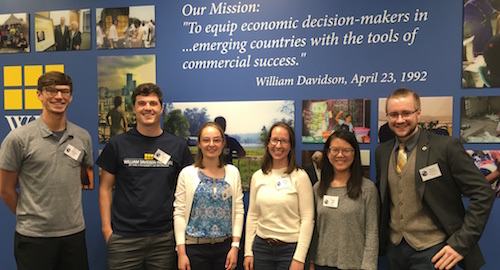
WDI’s 2018 summer interns before they set off on their voyages.
Over the years, WDI’s summer interns have faced unique challenges as they have conducted their work across the globe for the Institute and its partners. Impassable roads, extreme weather, the occasional wild animal. An active volcano can now be added to the list.
WDI intern Nadia Putri spent her summer in Bali, Indonesia working with East Bali Cashews on quality improvement projects, measuring the company’s impact on women and developing a U.S. market entry strategy. She also got an up close look at emergency preparedness.
“It was really beautiful, but a bit scary at the same time for someone who has never seen anything like it before,” she wrote of watching the sparks of lava and plume of smoke rise from the crater near where she was working. The cashew factory was outside the evacuation zone but management kept a daily eye on the volcano in case conditions changed. Earthquakes in the region have claimed nearly 400 lives during August.
Putri was one of six WDI interns working internationally this summer. Some, like Putri, have returned to the University of Michigan campus; others are finishing up their work and will be back in Ann Arbor soon. While overseas, the interns contributed to a blog to chronicle not only their work but also the experience of living in a foreign land. WDI has highlighted some of the work below and the full blog chronicling interns’ experiences is available here.
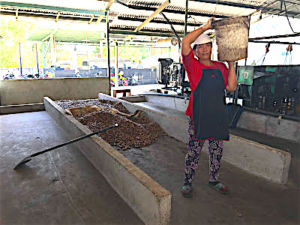
East Bali Cashews where Putri worked sources sustainably grown cashews from nearby smallholder farmers and processes them in a factory located in a remote village in one of Bali’s poorest regions. Since its launch in 2012, the company has integrated various social missions in and around its cashew processing operations, including community improvement and women’s empowerment.
Putri, a Ross School of Business MBA candidate, said factory workers were very supportive of her work and willing to explain how the company has impacted them. One employee recalled being hired after graduating from high school and is now in charge of 50 workers.
“At the factory, everyone is very welcoming and open to share their stories,” Putri wrote in her blog. “It’s especially humbling to see such high curiosity and willingness to learn from the factory employees. This serves as my daily reminder that (the) situation you grew up or lived in does not define who you could be.”
In Kenya, Andrea Arathoon, a School of Public Health graduate student, was tasked with helping a local maternity hospital reduce costs and increase patient volumes to achieve sustainability while also maintaining quality. One intervention Arathoon worked on for Jacaranda Maternity is a new outpatient care checklist for prenatal visits.
 The checklist is designed to improve patient processing within the outpatient clinic. This improved flow will reduce wait times and result in more efficient consultations, thus increasing patient volume and reducing costs, Arathoon wrote. She ensured the checklist followed the World Health Organization and Kenya Ministry of Health guidelines. The hospital’s doctors, nurses and administrative staff were consulted, and everyone was trained on how to properly use the new tool.
The checklist is designed to improve patient processing within the outpatient clinic. This improved flow will reduce wait times and result in more efficient consultations, thus increasing patient volume and reducing costs, Arathoon wrote. She ensured the checklist followed the World Health Organization and Kenya Ministry of Health guidelines. The hospital’s doctors, nurses and administrative staff were consulted, and everyone was trained on how to properly use the new tool.
“I am very excited about my summer project and the impact that it can have in improving maternity care for women and children in the country,” Arathoon wrote on the blog.
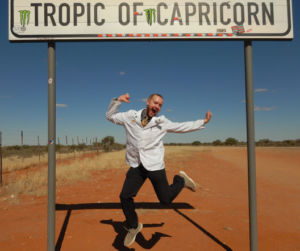
Across Africa on the Atlantic coast, Mason Benjamin is working in Namibia on pharmacy workforce development and hospital pharmacy practice. Benjamin, a College of Pharmacy graduate student, joined a collaborative project between WDI and the International Pharmaceutical Federation Hospital Pharmacy Section. The goal of the project, which includes the University of Namibia School of Pharmacy, is to increase the capacity of hospital pharmacists in Namibia through in-country diagnostics and technical assistance.
Benjamin has been traveling all across the country to visit hospital pharmacies in different regions to develop a landscape analysis of hospital pharmacy practices at both private and public hospitals. Before his site visits began, Benjamin attended the Medication Utilization Review In Africa (MURIA) conference, where he learned about pharmacy practice not only in Namibia but also across Africa.
“I was aware of how different the healthcare system in the United States might be from anywhere else in the world, but always felt that researching other systems online had its limits,” Benjamin wrote in the blog. “I much prefer to learn right from the source and in person, so I was grateful for the opportunity to ask questions to practicing pharmacists from over a dozen different African countries about how things worked in their setting.”
In India, the population of cities is expected to increase by 250 million people in the next 20 years, making employment a crucial need for the new transplants. Ross School of Business MBA student Chris Owen is working with MADE (Michigan Academy for the Development of Entrepreneurs) and its Madurai-based partner Poornatha, which is designing an affordable, world-class coaching curriculum for entrepreneurs in emerging economies. MADE was founded by WDI and U-M’s Zell Lurie Institute.
Owen is identifying best practices of existing coaching programs in India and other emerging economies, conducting a needs assessment of entrepreneurs in Madurai and developing a framework and training curriculum for how coaches will be identified, on-boarded and trained.
“By investing in strong local economies, India can address its dual-challenges of rapid urbanization and rising unemployment,” Owen wrote on the intern blog. “Indeed, for this reason, entrepreneurship in India – and the work of Poornatha – is becoming increasingly important.”
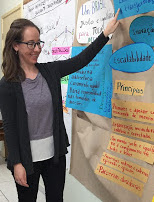 In Brazil, Rebecca Grossman-Kahn – a student at Ross and the U-M Medical School – is developing a tool to assess the social impact of the gender equality programs of Plan International’s Brazil office. Plan International has a long history of advocating for children’s rights but recently decided to focus its work in Brazil on promoting girls’ rights and equality. Gender roles in Brazil tend to be rigid and many girls stop studying in middle or high school to help with housework at home, Grossman-Kahn wrote on the blog. She attended a staff retreat to strategize on how to combat resistance from community members and organizations regarding Plan’s new focus on gender.
In Brazil, Rebecca Grossman-Kahn – a student at Ross and the U-M Medical School – is developing a tool to assess the social impact of the gender equality programs of Plan International’s Brazil office. Plan International has a long history of advocating for children’s rights but recently decided to focus its work in Brazil on promoting girls’ rights and equality. Gender roles in Brazil tend to be rigid and many girls stop studying in middle or high school to help with housework at home, Grossman-Kahn wrote on the blog. She attended a staff retreat to strategize on how to combat resistance from community members and organizations regarding Plan’s new focus on gender.
While at the retreat, a new World Bank report was released that showed girls who complete secondary education can expect to earn twice as much as those with no education.
“Studies like this can help get community leaders on board with Plan’s mission,” Grossman-Kahn wrote.
In Nepal, nearly two out of three working people are farmers. But the country’s rugged topography and lack of infrastructure makes it difficult to farm year-round despite a lengthy monsoon season. Additionally, in rural Nepal, only 5 percent of the population has reliable access to electricity. But the country has more than 300 days of sunshine, making it a perfect candidate for solar-powered agricultural services.
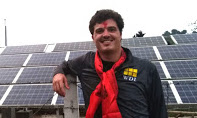 Matthew Carney, a dual degree student at Ross and the U-M School for Environment and Sustainability, spent the summer with the solar startup Ecoprise to help bring solar-powered agricultural services to subsistence farmers in the Terai region of Nepal that borders India. AgroHub, a pay-as-you-go service-based business model recently started by Ecoprise, provides access to solar-powered infrastructure for remote, underserved farming communities. These hubs provide farmers with access to equipment for irrigation, clean drinking water, food-processing and refrigerated post-harvest storage as a service.
Matthew Carney, a dual degree student at Ross and the U-M School for Environment and Sustainability, spent the summer with the solar startup Ecoprise to help bring solar-powered agricultural services to subsistence farmers in the Terai region of Nepal that borders India. AgroHub, a pay-as-you-go service-based business model recently started by Ecoprise, provides access to solar-powered infrastructure for remote, underserved farming communities. These hubs provide farmers with access to equipment for irrigation, clean drinking water, food-processing and refrigerated post-harvest storage as a service.
AgroHub has proved very successful for those farmers who have used it, allowing them to irrigate more land during the winter and monsoon seasons and reducing the use of diesel-powered water pumps that saves money. Carney’s task is to develop a plan to bring the service to farmers in western Nepal.
“Solar-powered agriculture presents an opportunity to raise the living standards of millions of rural Nepali farmers in a sustainable fashion,” he wrote. “It would be a shame to waste it.”
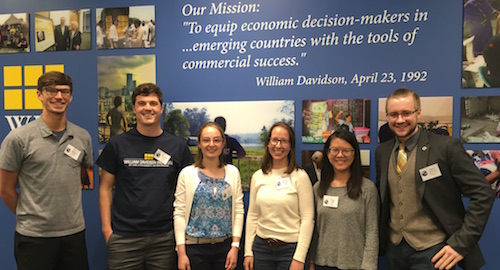
Six U-M graduate students are participating in the 2018 WDI Global Impact Internship program.
When Rebecca Grossman-Kahn was in high school, she was a volunteer with Amigos de las Américas, a youth leadership and cultural exchange program that partners with Plan International, a global development and humanitarian organization. While an undergrad at Stanford University, she worked in Honduras and Nicaragua for the organization.
“I just loved it,” she said. “I loved living in a different place, I loved speaking Spanish.”
So when the Ross School of Business MBA candidate and University of Michigan Medical School student was looking to create her own summer internship, she reached out to several organizations. The first to respond was Plan International, which works to empower children – especially girls.
“They were interested in revamping their evaluation program and I knew WDI worked in performance measurement,” Grossman-Kahn said.
She pitched the partnership to WDI as a student-initiated internship and it was approved. In mid-June, she will head to Brazil to develop a survey tool Plan International will use to assess the impact of their programs. In addition to student-initiated internships, WDI also develops student summer opportunities along with its partners.
Grossman-Kahn is one of six U-M graduate students participating in the 2018 WDI Global Impact Internship program. The students represent the Ross School of Business, the School of Public Health, the College of Pharmacy, the School for Environment and Sustainability (SEAS) and the Medical School. They will work in Brazil, India, Indonesia, Kenya, Namibia and Nepal, and support the work of WDI initiatives in Education and its Entrepreneurship Development Center, Energy, Healthcare, Performance Measurement and Scaling Impact. All of the interns have met with their respective WDI initiative leaders and will continue to keep in touch once in the field.
Colm Fay, who leads WDI’s Energy Initiative, said he is interested in understanding more about access to energy for productive use because of the impact it can have in low- and middle-income countries. Fay will be working with graduate student Matthew Carney, who will be interning at Ecoprise, which designs, builds and installs clean energy products in Nepal for energy-poor communities.
“Matt’s work with Ecoprise will provide important learnings about how an innovative business model to provide energy for agricultural loads can impact rural livelihoods, and how the well-being of these communities can be enhanced through greater access to energy,” Fay said.
Fay also directs WDI’s Scaling Impact initiative and is working on a project in Kenya with intern Andrea Arathoon. He said Scaling Impact wants to develop tools and frameworks that help enterprises achieve sustainability at scale.
“Andrea’s experience with Jacaranda, an organization that is seeking both to scale its operations as well as replicate its approach through partners, will further our understanding of the strategies and resources that are necessary to design business models for scale,” Fay said. “Her work will also provide great insights on how enterprises measure performance in terms of both sustainability and impact, and how best to frame this for investors.”
For Grossman-Kahn, her summer in Brazil will not be her first trip to the country. She lived there while participating in a study abroad program as an undergrad and learned Portuguese. She is looking forward to going back and collaborating with a familiar partner.
Grossman-Kahn said she will split her time between doing high-level strategy work in an office in Sao Paulo and observing Plan International’s programs in rural towns.
“I’m really excited about working with Plan International again,” she said. “They are really mission driven. Everyone in the organization is passionate about the work they’re doing.”
Here are the all WDI interns and their projects:
Andrea Arathoon
School of Public Health
Jacaranda Health
Nairobi, Kenya
WDI Partner: Scaling Impact initiative
Jacaranda Health operates a maternity hospital where it sees more than 2,000 clients a month and wants to create East Africa’s first truly sustainable and scalable maternal health service delivery organization. It is partnering with 15 government hospitals to refine a model for improving quality of maternal healthcare in the public sector.
Andrea will develop the latest version of Jacaranda’s business model and debt/equity financing structure for its next round of investment. She also will assess market and business model opportunities for expansion, improve profitability in the hospital by evaluating new service lines, marketing and customer insights.
Mason Benjamin
School of Pharmacy
WDI & International Pharmaceutical Federation (FIP) Hospital Pharmacy Section (HPS)
Namibia
WDI Partner: Healthcare initiative
FIP is a global federation representing 3 million pharmacists and pharmaceutical scientists worldwide. The Hospital Pharmacy Section’s objectives are to further hospital pharmacy in all its aspects, including the needs of developing countries. FIP, in partnership with WDI, is establishing a collaboration with the University of Namibia School of Pharmacy to increase the capacity of hospital pharmacists in two pilot countries, Namibia and Pakistan, through in-country diagnostics and technical assistance. The summer intern will provide preliminary research on Namibia, which will then inform next steps and content design for this collaboration in pharmacy workforce development.
Mason will develop a landscape analysis of hospital pharmacy practices in Namibia, both at private and public hospitals, in support of a larger pharmacy workforce development goal.
Nadia Putri
Ross School of Business
East Bali Cashews
Bali, Indonesia
WDI Partner: Entrepreneurship Development Center (Education Initiative)
Founded in 2012, East Bali Cashews (EBC) sources sustainably grown cashews from nearby smallholder farmers and processes them in a factory located in a remote village in one of Bali’s poorest regions. Since its launch, the company has integrated various social missions in and around their cashew processing operations, including community improvement and women’s empowerment.
For her internship, Nadia will design a U.S. market entry strategy and actionable roadmap, develop sustainable quality and efficiency improvements and create a food production “best practices” guide. Additionally, in partnership with WDI’s Entrepreneurship Development Center, Nadia will develop a strategy to support EBC’s mission for women empowerment and develop a mini case study how they would achieve it.
Chris Owen
Ross School of Business and School for Environment and Sustainability
Michigan Academy for the Development of Entrepreneurs (MADE)
India
WDI Partner: WDI President Paul Clyde
The Michigan Academy for the Development of Entrepreneurs (MADE) is a U.S.-based nonprofit organization whose aim is to develop entrepreneurs in emerging economies. MADE was founded by the William Davidson and Zell-Lurie Institutes at the University of Michigan and Aparajitha Foundation in Madurai, India. MADE provides Entrepreneurship Development Organizations (EDOs) in emerging economies a repeatable, scalable, transferable and profitable service platform to develop entrepreneurs in their home countries.
For his project, Chris will Identify best practices of existing coaching programs in India and other emerging economies, conduct a needs assessment of entrepreneurs in Madurai and develop a framework and training curriculum for how coaches will be identified, on-boarded and trained. Chris’ work continues a succession of Ross School student teams who have worked with MADE since its launch in late 2017.
Rebecca Grossman-Kahn
Ross School of Business and University of Michigan Medical School
Plan International
Brazil
WDI Partner: Performance Measurement initiative
Plan International is a not-for-profit, non-governmental organization founded in 1937. It is a development and humanitarian organization that advances children’s rights and equality for girls through various programs.
For her internship, Rebecca will develop a tool to assess the social impact of Plan Brazil’s gender equality programs; develop a framework for evaluating impact of violence prevention and girls’ empowerment programs that can be adapted to other partner organizations and in other settings. In addition, Rebecca will also analyze Plan International’s program cost structure and provide recommendations for standardizing and cost savings.
Matthew Carney
Ross School of Business and School for Environment and Sustainability
Ecoprise
Nepal
WDI Partner: Energy initiative
Founded six years ago, Ecoprise designs, builds and installs clean energy products in Nepal for the underserved, energy-poor communities in order to create positive economic, environmental and social impact. Ecoprise recently started AgroHub, a pay-as-you-go service-based business model that aims to provide access to solar-powered infrastructure for remote underserved farming communities. These hubs provide farmers with access to equipment for irrigation, clean drinking water, food-processing and refrigerated post-harvest storage as a service, with ownership of equipment remaining with AgroHub or Ecoprise.
Matthew will develop a theory of change report and a business plan for Ecoprise’s AgroHub model in western Nepal.
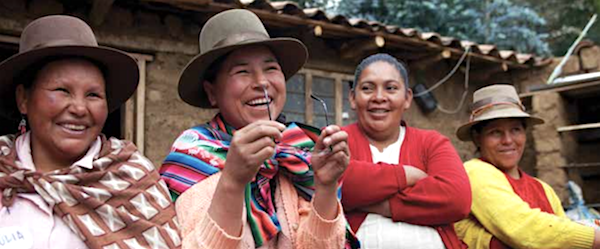
Women working with Chakipi Acceso in Peru. Image courtesy of Chakipi.
Note: The following post was co-written by Rebecca Baylor, Heather Esper and Yaquta Kanchwala Fatehi of WDI’s Performance Measurement Initiative. It was originally published on NextBillion.net, which is managed by WDI.
For many businesses and organizations, the idea of measuring their impacts is usually one of three things: scary, elusive or just plain boring. To make matters worse, evaluators have a rotten reputation for using too much annoying technical jargon. While there is some truth to these stereotypes, it doesn’t have to be all bad.
Our work demonstrates that it is possible to bridge the gap between people and metrics in a meaningful way.
In fact, our team at the William Davidson Institute recently released an impact report that demonstrates how we guided three organizations on how to demystify data collection of their social impacts. We worked with senior level leadership to develop strong surveys and data collection processes suited to their context. Perhaps more importantly, we openly discussed their measurement concerns and made explicit– dare we say, energetic– connections between their impact metrics and organizational strategy.
A key theme throughout this project was our goal to combine social and business metrics. When organizations – from enterprises to impact investors – actually track these types of combinations, which we refer to as “power couples,” they can absorb unique insights to solve key business challenges while communicating impact evidence. Through our work, we have encountered a number of social + business metric power couples that we’ve seen influence internal decision-making at organizations and improve results. Creating these power couples enables managers to more holistically harness their data to better meet business goals and increase intended impacts. For example, employee retention, an all-important business metric, may be affected by the impact that an organization has on the quality of life of their employees’ children, a social metric. This may be especially true for low- or middle-income employees.
Here are just a few common power couples that we identified during this project (detailed in the report) and others.
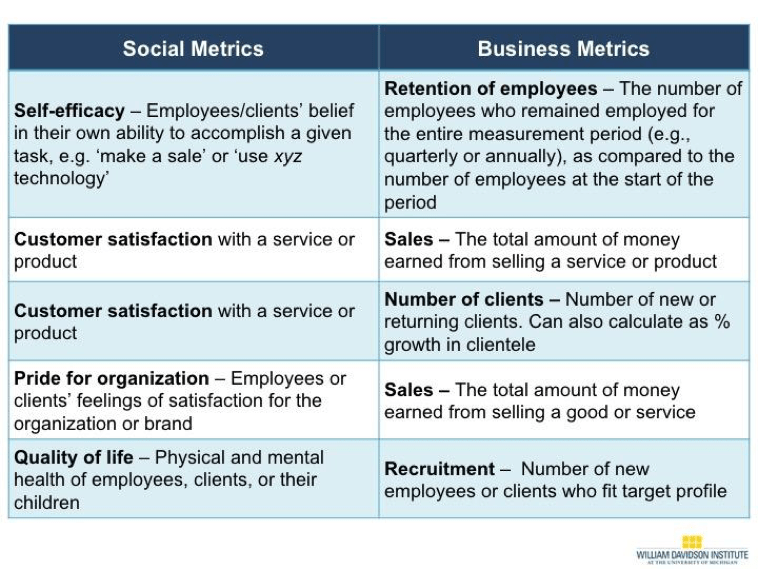
This list is just a start.
Selecting metrics takes time and patience. Indeed, finding the right metrics can be a lot like parenting. There isn’t one perfect formula and your strategy will likely evolve over time. However, we recommend businesses and investors interested in seeing social or environmental impact use some of the following strategies to make their job easier. We’re also including relevant resources to help you apply these strategies:
We hope these combinations excite you and inspire you to create a few social + business metrics of your own. Also, check out our case study for five lessons learned to accelerate successful impact measurement as an investor or investee. And if you enjoyed this post, share it, tweet it, or comment below! We’re also very curious about what social + business metric combinations have or haven’tworked for you. We look forward to hearing from you.
See? Impact measurement isn’t as scary (or as boring) as it may first seem.
Rebecca Baylor is a research associate for the Performance Measurement Initiative.
Heather Esper is the senior program manager for WDI’s Performance Measurement Initiative.
Yaquta Kanchwala Fatehi is a program manager for WDI’s Performance Measurement Initiative.
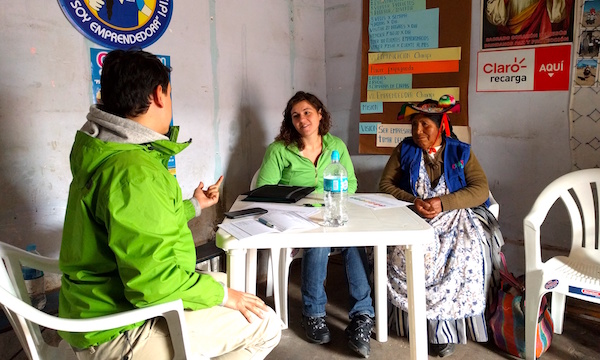
Many organizations working with small businesses in low-income countries struggle with how to separate powerful, but anecdotal, stories from true social impact that can be replicated.
The newly released WDI Impact Report, “Positive Change Through Actionable Metrics,” reviews the work of the Institute’s Performance Measurement Initiative (PMI) while pilot-testing a new framework in Brazil, Nicaragua and Peru designed to increase the impact of small, inclusive businesses and their distribution networks.
The latest report traces WDI’s work back to a 2015 Mexico conference sponsored by the Inter-American Development Bank (IDB) where WDI Senior Program Manager Heather Esper debuted the new framework, which includes a mix of standardized social and business metrics over the short and long term. There was great interest in having WDI pilot the framework with different micro-distribution organizations in IDB’s SCALA network, which brings together anchor companies, microfinance institutions, academia and non-governmental organizations to combine efforts to grow inclusive distribution networks.
Three SCALA network organizations were selected – Supply Hope in Nicaragua, Chakipi Acceso in Peru and Kiteiras in Brazil – and WDI went to work to identify indicators from the framework that would properly reflect the impact on the micro-distributors for each venture. The team also developed context-specific collection plans for gathering the necessary data. This helped the enterprises increase their data collection skills, and allowed WDI to test how much practical guidance future organizations would need if they were using the framework.
 “We are pleased to release this impact report that highlights our work with three great organizations to achieve measurement that is actually meaningful to them,” said WDI Research Associate Rebecca Baylor. “The teams we worked with deserve a lot of credit for the success of this project. So many organizations are struggling with how to measure their impacts, and these teams were willing to have in-depth conversations and reflect on their data collection practices.”
“We are pleased to release this impact report that highlights our work with three great organizations to achieve measurement that is actually meaningful to them,” said WDI Research Associate Rebecca Baylor. “The teams we worked with deserve a lot of credit for the success of this project. So many organizations are struggling with how to measure their impacts, and these teams were willing to have in-depth conversations and reflect on their data collection practices.”
As the report chronicles, WDI developed surveys for the three organizations and helped them collect and analyze the data. The work culminated in a set of recommendations for the three organizations to apply in future impact measurement activities. All three gained a better understanding of how to measure changes in the well-being of their micro-distributors.
“They were committed to building their capacity for making decisions with the data they collect,” Baylor said. “This report shares the process we went through together and will be valuable for other organizations who are striving to accomplish the same.”
It’s the second report in an ongoing series that chronicle the long-term impact WDI is having in certain sectors or geographies. The first WDI Impact Report, “Improving Business Education in the Philippines,” debuted in March 2017. It examined the Institute’s contributions to the five-year STRIDE project that focused on strengthening the science, technology, research and innovation capacity on the island nation.
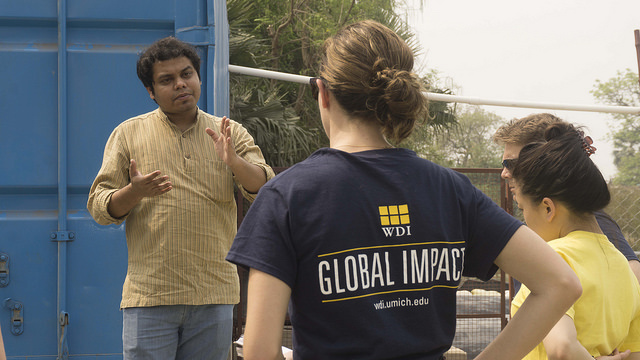
From a 2017 WDI-sponsored MAP team.
WDI’s partnership with Aravind Eye Care System dates back to 1999. Over the years, the organization has utilized a combination of student MBA teams and other engagements with the Institute to explore new ideas for growing strategically and improving operations at its hospitals and clinics, which offer world-class eye care at affordable prices.
Just a few of those completed projects include determining the appropriate governance structures for Aravind, consulting on expanding geographically and growing eye care services, implementing improved operational processes, delivering HR capabilities and leadership training for physicians, and improving the culture and patient experiences. Each of those projects were sponsored by WDI as part of the Ross School of Business’s annual Multidisciplinary Action Projects (MAP).
In 2016, a student team customized and tested an existing process model at select Aravind facilities that measured performance of each unit in terms that everyone in the organization could understand. Last year, the Aravind MAP team worked with senior leadership to develop a roadmap for the eyecare system’s future growth.
MAP is an action-based learning course offered at Ross in which MBA students receive guidance from faculty advisors. Each project requires analytical rigor, critical thinking, and teamwork. (Find out more about WDI’s MAP projects over the years here.)
After learning about their projects and conducting secondary research for several weeks, the students spend two to four weeks working with their organizations in the field.
In March, a MAP team (one of nine sponsored by WDI) will travel to Chennai, India to work at Aravind’s largest facility, which opened in September 2017 and offers the usual suite of services to patients, including specialty eye surgeries. As the new facility nears its six-month anniversary, administrators are studying patient care and looking for areas of improvement.
The students, as part of their overall work to enhance the patient experience, will work with Aravind leadership to develop recommendations on how to transition some of the work performed by eye specialists to general ophthalmologists, who are currently underutilized. Before heading to Chennai on March 17, the team will meet with faculty at the University of Michigan’s Kellogg Eye Center to hear how they manage similar issues.
Members of the MAP team said they are eager to observe the Aravind business model, which student Gerard Heath called “a leader around the world in developing solutions to provide high quality care in low-resource environments.” They all think the experience and work at Aravind will help them in the classroom as they finish up their studies, and may help inform their future career paths.
Kelsey Wyatt-Mair said she is interested in operations and “learning from this hands-on experience will equip me for later in my career, whether it’s in or out of healthcare.”
And Katie Zurales is “excited to see a different healthcare system” and how high quality, cost-effective healthcare “translates to different cultures.”
Of the four team members, which also includes Daniel Semaan, only Wyatt-Mair has some international work experience.
“It will be interesting for all of us – how to navigate that culture,” Wyatt-Mair said. “We’ll get exposed to the similarities and differences of Aravind with, say, Kellogg Eye Center.”
In between the work, the group plans to explore some local temples and beaches and perhaps travel to other cities. They said they were excited to discover Chennai was listed as one of the world’s best “food cities.”
WDI Initiatives often recruit partner organizations to work with MAP teams. The Aravind project is aligned with the Institute’s Healthcare Initiative. Similarly, WDI’s Education Initiative is working with the MAP team assigned to the Technological Institute of the Philippines (TIP) project. The students will create a strategic plan for a newer TIP initiative to improve the engineering and technology skills of students.
Amy Gillett, vice president of WDI’s Education Initiative, said MAP teams are one of the ways the initiative can improve the delivery of management education in emerging markets.
“The MAP teams bring new perspectives to universities in emerging markets,” she said. “They help university leadership think in different ways about how to expand into promising new areas or how to think strategically about growing an existing department or initiative. We’re so pleased to have this opportunity to unite MBA students – with their passion for social impact and their strategic thinking – with our university partners who welcome fresh insights.”
Like many of the Institute’s MAP partners, TIP has collaborated with WDI in the past. TIP was one of three university partners that worked with WDI on the STRIDE project.
“We’re so pleased to continue our successful partnership with TIP,” Gillett said. “During a recent trip to Manila, I had the opportunity to meet with TIP’s leadership. I was really impressed by their commitment to providing access to a college education for underserved communities as well as by their drive to continuously improve their operations and the services they offer to students.”
Here is a summary of each WDI-sponsored MAP project:
Aparajitha Foundations – India
Advisors: Paul Clyde, WDI and Ross School of Business; Stewart Thornhill, Zell Lurie Institute for Entrepreneurial Studies and Ross School of Business
MAP Team: Amirah Patterson, Riki Smolen, Robert Mack, Nathan Stevens
Aparajitha Foundations is a charitable trust that supports the less privileged, mainly in the areas of education and health.
The team will co-create alongside the founding team of the Michigan Academy for the Development of Entrepreneurs (MADE) as they test, validate, and iterate on MADE’s business model and product prototype for supporting entrepreneurs and Small Medium Enterprises (SMEs) in Madurai, India. MADE is a nonprofit institute established at the Ross School of Business by the Zell Lurie Institute for Entrepreneurial Studies, in partnership with WDI and Aparajitha Foundations, that works with entrepreneurship development organizations in developing countries to give individuals operating businesses in these environments the knowledge and best practices they need to thrive.
Aravind Eye Care System – India
Advisors: Paul Clyde, WDI and Ross School of Business; Jim Walsh, Ross School of Business
MAP Team: Gerard Heath, Katie Zurales, Daniel Semaan, Kelsey Wyatt-Mair
Aravind Eye Care System is a vast network of hospitals, clinics, community outreach efforts, factories, and research and training institutes in south India that has treated more than 32 million patients and has performed 4 million surgeries since its 1976 founding.
The MAP team will develop a framework for integrated patient care service delivery.
CURE International – Ethiopia
Advisors: Paul Clyde, WDI and Ross School of Business
MAP Team: Simon Kaufmann, Keegan McQuillan, Alan Wisniewski, Brandon Yelen
CURE operates clubfoot clinics in 17 countries around the world, each tasked with helping children and families deal with the congenital deformity that twists the foot, making it difficult or impossible to walk. In Ethiopia, CURE manages 37 clinics.
The MAP team will work to improve quality and increase scale of leg brace production in Ethiopia.
Ghana Emergency Medicine Collaborative – Ghana
Advisors: David Butz, WDI and Ross School of Business; Jim Walsh, Ross School of Business
MAP Team: Alexander Ukoh, Liam Kraft, Kartik Raju, Shreyance Mandaliya
The Ghana Emergency Medicine Collaborative aims to improve emergency medical care in Ghana through innovative and sustainable training programs for physician, nursing and medical students. The goal of the training programs is to increase the number of qualified emergency health care workers retained over time in areas where they are most needed.
The student team will investigate the feasibility of incorporating mobile payments into the emergency department workflow, including an analysis of how that will impact both the finances and operations of the department.
Imperial Logistics – South Africa
Advisors: David Butz, WDI and Ross School of Business; Ravi Anupindi, Ross School of Business
MAP Team: Justin Loescher, Jasmine Knowles, Courtney Alexander, Javier Castillo
Imperial Logistics provides logistics and supply-chain management across the African continent, and is a leading distributor of medicines and healthcare products.
The MAP team will establish an African Pharmaceutical Wholesaler Association (APWA).
Outbound Initiative – Brazil
Advisors: Paul Clyde, WDI and Ross School of Business; Stewart Thornhill, Zell Lurie Institute for Entrepreneurial Studies and Ross School of Business
MAP Team: Tsering Sherpa, Daniel Vergara Ramirez, Dale Jarosz, Varun Haralalka, Agustin Sosa, Mike Porcelli
Outbound Brasil uses the latest technology to identify global opportunities and resources for the growth of innovative and high impact business in that country, such as new and better markets, customers, partnerships, investments and awards.
The team will conduct a situation analysis on the Brazilian tech investment scenario and make recommendations for which innovations could make smart money more accessible to local startups.
REFRESCH – Gabon
Advisors: Paul Clyde, WDI and Ross School of Business; Bob Dittmar, Ross School of Business
MAP Team: Alena Golovchenko, Felipe Prieto Nunez, Sean Welsh, Allie Murphy
REFRESCH (Researching Fresh Solutions to the Energy/Water/Food Challenge in Resource Constrained Environments), is a consortium of educators and researchers working to improve the lives of those living in resource-constrained communities. Its goal is to find solutions to challenges in the areas of food, water and energy. It is funded by the University of Michigan Third Century Initiative and is headquartered at the University of Michigan Energy Institute.
The student team will identify a set of commercially viable business model archetypes or templates to increase access to renewable energy products and services in Gabon. They also will develop a recommendation on the most likely template to be profitable. A secondary goal is to understand the entrepreneurial skills and capabilities required to launch and operate such enterprises.
Technological Institute of the Philippines (TIP) – Philippines
Advisor: Paul Clyde, WDI and Ross School of Business
MAP Team: Joseph Grandominico, James Schoen, Alexa Thomas, Charlton Washington.
The Technological Institute of the Philippines (T.I.P.) is a leading private tertiary education institution that specializes in engineering and technology courses, and has an enrollment of 25,000 students on campuses in Manila and Quezon City. In 2016, the school launched T.I.P. TechnoCoRe, which aims to develop engineering and technology students’ skills in problem-business opportunity formulation, ideation, validation and execution – the core skills of technopreneurship.
The student team will create a strategic plan for T.I.P. TechnoCoRe.
Vayu Inc – Senegal
Advisor: Paul Clyde, WDI and Ross School of Business
MAP Team: Alexander Franczyk, Brandon Pickett, Adam Ronk, Adam Woodruff.
Vayu has developed an unmanned aerial vehicle (UAV) that can be used to deliver needed medical supplies and products to remote areas. The UAV launches and lands like a helicopter and flies like an airplane once off the ground. It can fly 100 kilometers and hold just over two kilograms of payload.
The team will conduct market analysis and develop an entry strategy for introducing delivery UAVs into Senegal’s market.
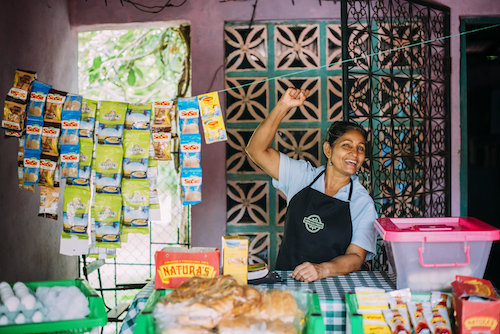
Image credit: Dani Cowan/Supply Hope
A new case study authored by WDI’s Performance Measurement Initiative (PMI) that gives advice to impact investors and investees on new and emerging ways to strengthen their impact measurement practices will be released at two major, international conferences this week.
The case, “Accelerating Measurement within Impact Investing: Five Critical Lessons,” will be shared with attendees at the Latin American Impact Investing Forum (FLII) in Merida, Mexico and the Aspen Network of Development Entrepreneurs (ANDE) “Metrics from the Ground Up” conference in Nairobi, Kenya. It tracks the WDI team as it pilot-tested its new impact measurement framework with three social enterprises in Nicaragua, Brazil and Peru, and provides recommendations to strengthen the impact measurement practices of investors as well as the enterprises they support.
“We are excited to release the case study at these conferences because the five key lessons will be familiar to many in attendance, and may provide useful insights to related measurement challenges they are facing,” said Heather Esper, senior program manager for PMI. “At the FLII event, the attendees will be impact investors or those working with them. The report, which we’re also releasing in Spanish, will be directly relatable to them and provide guidance on how to address key obstacles they encounter when trying to measure the ‘impact’ in impact investing.”
Esper will be joined at the FLII event by Diana Paez, director of WDI’s Grants Management department, to meet with potential partners who are interested in carrying out work similar to the pilot projects featured in the report.
PMI Program Manager Yaquta Kanchwala Fatehi will participate in the ANDE conference, where presenters and the audience will share experiences about different approaches to evaluation, the challenges each approach presents and building bridges between different approaches.
“We will also look to identify potential strategies to address those challenges in the different contexts where participants have done measurement and evaluation,” Fatehi said.
WDI’s case study comes at an opportune time as the call for better impact measurement grows globally. A December 2017 ANDE report found that more than half of the member organizations they surveyed have no full-time staff person dedicated to measurement. Additionally, nearly all respondents spent less than 5 percent of their annual budget on measurement.
Similarly, in a recent report by the Global Impact Investing Network (GIIN) many survey respondents said measurement issues, as opposed to management concerns, were a big challenge. In the GIIN survey, 43 percent of respondents cited significant challenges in collecting quality data, while 32 percent said aggregating, analyzing, and/or interpreting data across a portfolio was a problem for them.
For WDI’s report, the PMI team identified five valuable lessons they learned from working on the three pilots. They are summarized in the table below.
| Recommended activity | Value for Impact Investors and Social Enterprises |
| Use standard indicators, not standard measures | Contextualize data collection to ensure accurate data |
| Use a Theory of Change | Articulate impact, decide what to measure, assign indicators |
| Support M&E capacity building techniques | Speak the same language, conduct M&E without external teams, maintain sustainable M&E practices |
| Mix social outcomes with key business performance indicators | Strengthen mission and ability to scale |
| Foster a senior-level staff as a M&E champion | Help facilitate embedding of data collection into existing business processes |
Rebecca Baylor, a PMI research associate, said the recent reports highlighted the need for businesses and impact investors to reconsider and re-energize how to incorporate measurement into their own practices.
“Our team is excited to engage in that conversation by sharing experiences from our own work,” she said. “Our case study not only speaks to the struggles of individual businesses but also generalizes findings about how to incorporate measurement at scale across multiple similar enterprises.”